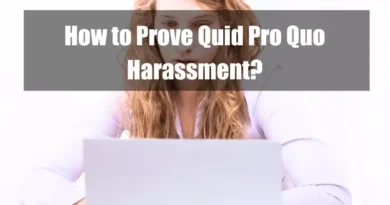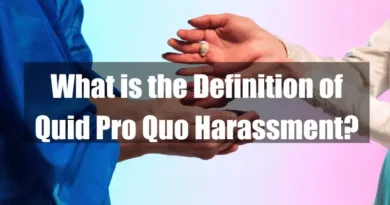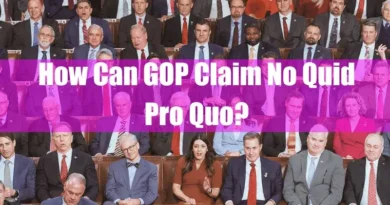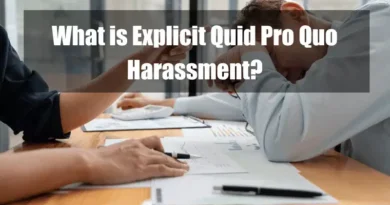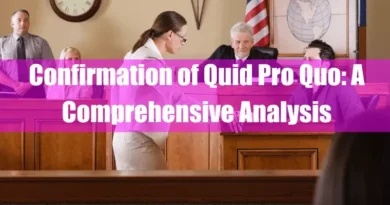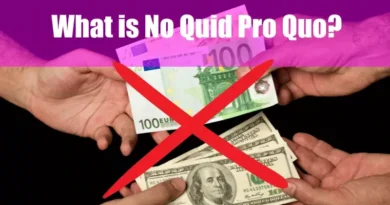The Quid Pro Quo Transcript
In July 2019, a phone call between U.S. President Donald Trump and Ukrainian President Volodymyr Zelensky raised concerns about a possible quid pro quo arrangement. The released transcript of this call shows President Trump asking President Zelensky to investigate former Vice President Joe Biden and his son, Hunter Biden, who was associated with the Ukrainian energy company Burisma. Specifically, President Trump stated, “There’s a lot of talk about Biden’s son, that Biden stopped the prosecution, and a lot of people want to find out about that.”
While the transcript does not explicitly link this request to withholding military aid, subsequent testimonies and text messages among U.S. diplomats suggest that a White House meeting and military assistance were conditioned on Ukraine initiating these investigations. For instance, Ambassador Gordon Sondland indicated that “resumption of U.S. aid would likely not occur until Ukraine provided the public anti-corruption statement that we had been discussing for many weeks.” These developments became central to the impeachment inquiry into President Trump.
Introduction
The term “Quid Pro Quo Transcript” refers to the memorandum summarizing the July 25, 2019, phone call between then-U.S. President Donald Trump and Ukrainian President Volodymyr Zelensky. This conversation became a pivotal element in the political discourse of the United States, leading to an impeachment inquiry against President Trump.
The call’s content raised questions about the appropriateness of a U.S. president soliciting investigations from a foreign leader into domestic political rivals, thereby highlighting concerns about the integrity of U.S. electoral processes and the conduct of foreign policy.
Background
U.S.-Ukraine Relations Prior to 2019
The United States and Ukraine have maintained a complex relationship since Ukraine’s independence from the Soviet Union in 1991. The U.S. has been a significant supporter of Ukraine, providing economic aid, promoting democratic reforms, and, following Russia’s annexation of Crimea in 2014, supplying military assistance to bolster Ukraine’s defense capabilities. This support aimed to counter Russian aggression and support Ukraine’s sovereignty and territorial integrity.
Context Leading Up to the July 25, 2019 Call
In 2019, Ukraine elected Volodymyr Zelensky, a former comedian and political outsider, as its president. His election was seen as a mandate for reform and anti-corruption efforts. At the same time, President Trump and his personal attorney, Rudy Giuliani, expressed interest in having Ukraine investigate matters related to the 2016 U.S. presidential election and the business activities of Hunter Biden, son of former Vice President Joe Biden, who was a potential challenger to Trump in the 2020 election. These converging interests set the stage for the July 25 call between Trump and Zelensky.
The July 25, 2019 Phone Call
Participants Involved
The call involved President Donald Trump and President Volodymyr Zelensky as the primary speakers. Several officials listened in, including:
- Mike Pompeo: Secretary of State
- Timothy Morrison: Senior Director for European Affairs at the National Security Council
- Alexander Vindman: Top Ukraine expert at the National Security Council
- Charles Kupperman: Deputy National Security Adviser
- Robert Blair: Senior Adviser to the White House Chief of Staff
- Keith Kellogg: National Security Adviser to the Vice President
- Jennifer Williams: Adviser to the Vice President for Europe and Russia
These individuals were either present in the Situation Room during the call or had access to its contents afterward.
Key Topics Discussed
President Trump congratulated President Zelensky on his recent electoral victory during the conversation. The dialogue then shifted to discussions about U.S. support for Ukraine and European nations’ contributions. President Zelensky expressed interest in purchasing more Javelin missiles from the U.S. President Trump responded by requesting a “favor,” asking Zelensky to investigate:
- A debunked conspiracy theory involving CrowdStrike and the 2016 DNC server hack.
- Allegations concerning former Vice President Joe Biden and his son, Hunter Biden, related to the Ukrainian company Burisma.
Trump emphasized the importance of these investigations, stating, “There’s a lot of talk about Biden’s son, that Biden stopped the prosecution, and a lot of people want to find out about that.”
Release and Content of the Transcript
The White House released a memorandum of the call on September 25, 2019. This document, labeled as “not a verbatim transcript,” was based on notes and recollections of Situation Room duty officers and National Security Council staff. It provided a detailed account of the conversation, including President Trump’s requests for investigations and discussions about U.S. aid to Ukraine. The release of this memorandum intensified scrutiny and led to the initiation of an impeachment inquiry.
Allegations of Quid Pro Quo
Definition and Explanation of Quid Pro Quo
The term “quid pro quo” is Latin for “something for something,” indicating an exchange where one party provides a favor or advantage in return for something of equal value from another party. In legal contexts, it often pertains to situations where benefits are conditioned upon reciprocation, which can raise ethical or legal concerns, especially in public office.
Negotiations may involve exchanges in foreign policy, but these are typically conducted to further national interests and adhere to legal standards. The distinction between acceptable diplomatic negotiations and improper quid pro quo arrangements hinges on the intent and legality of the exchange.
Analysis of the Call’s Content Pertaining to Allegations
During the July 25, 2019, phone call between President Donald Trump and Ukrainian President Volodymyr Zelensky, President Trump requested investigations into former Vice President Joe Biden and his son, Hunter Biden, as well as a debunked theory regarding Ukrainian interference in the 2016 U.S. election. This request came after President Zelensky expressed interest in acquiring military aid from the United States.
The sequence of these discussions led to allegations that President Trump was conditioning military assistance and a White House meeting on Ukraine’s willingness to initiate these investigations, suggesting a quid pro quo arrangement.
Critics argue that leveraging presidential powers for personal political gain constitutes an abuse of power. Supporters of President Trump contend that the call’s content does not explicitly establish a quid pro quo and that the aid was eventually released without the investigations being conducted.
Reactions and Responses
Political Responses Within the United States
The call’s disclosure elicited polarized reactions within the U.S. political landscape. Democrats viewed the call as evidence of President Trump’s misuse of office for personal political advantage, leading to the initiation of an impeachment inquiry. They argued that soliciting foreign interference in domestic elections undermines democratic institutions and national security.
Republicans largely defended President Trump, asserting that the call did not demonstrate a clear quid pro quo and that the president acted within his rights to address corruption concerns. This partisan divide was evident throughout the impeachment proceedings.
International Reactions
Internationally, reactions varied. Some foreign leaders and diplomats expressed concern over the implications of the call, particularly regarding the precedent it might set for international relations and the conduct of foreign policy. However, many governments refrained from public commentary, viewing the situation as an internal matter for the United States.
However, the controversy cast a spotlight on Ukraine, placing President Zelensky in a challenging position as he sought to maintain support from the U.S. while navigating the political fallout.
Impeachment Inquiry and Proceedings
Initiation of the Impeachment Inquiry
The impeachment inquiry was formally initiated on September 24, 2019, by Speaker of the House Nancy Pelosi following revelations from a whistleblower complaint regarding the July 25 call. The complaint alleged that President Trump solicited foreign interference in the 2020 election and that White House officials attempted to conceal records of the call.
Key Testimonies and Evidence Presented
The inquiry featured testimony from multiple officials, including:
- Gordon Sondland, U.S. Ambassador to the European Union, who testified that there was a clear quid pro quo linking a White House meeting to the announcement of investigations.
- Alexander Vindman, a National Security Council official, who expressed concerns about the call’s content and its potential implications for U.S. national security.
- Fiona Hill, a former National Security Council expert on Russia, who provided insights into the administration’s interactions with Ukraine.
These testimonies, along with others, painted a picture of a concerted effort to pressure Ukraine into conducting investigations that could benefit President Trump’s political prospects. The evidence included witness accounts, text messages, and emails corroborating the alleged quid pro quo arrangement.
Outcome of the Impeachment Process
The House of Representatives voted to impeach President Trump on December 18, 2019, on two articles: abuse of power and obstruction of Congress. The abuse of power charge stemmed from the Ukraine affair, while the obstruction charge related to President Trump’s refusal to cooperate with the inquiry.
The Senate trial commenced in January 2020, resulting in President Trump’s acquittal on both charges on February 5, 2020. The vote largely followed party lines, with Senator Mitt Romney being the sole Republican to vote for conviction on the abuse of power charge.
The impeachment proceedings underscored deep political divisions within the United States and highlighted ongoing debates about presidential power and accountability limits.
Legal and Ethical Considerations
Examination of U.S. Laws Pertinent to the Case
The July 25, 2019, phone call between President Donald Trump and Ukrainian President Volodymyr Zelensky raised significant legal questions, particularly concerning U.S. campaign finance laws. Federal law prohibits soliciting or accepting contributions from foreign nationals in connection with U.S. elections.
Legal experts have argued that President Trump’s request for Ukraine to investigate a political opponent could be construed as soliciting a “thing of value” from a foreign entity, potentially violating these statutes.
However, the Department of Justice concluded that the call did not constitute a campaign finance violation, determining that the evidence did not establish a criminal offense.
Ethical Implications of the Actions Discussed
Beyond legal considerations, the ethical ramifications of the call have been widely debated. Critics contend that leveraging presidential power to solicit foreign investigations into a domestic political rival undermines the integrity of democratic institutions and the electoral process. Such actions could set a concerning precedent, suggesting that personal political interests may influence foreign policy decisions.
Supporters of President Trump argue that addressing potential corruption, regardless of political implications, falls within the president’s duties and that the call was an appropriate exercise of executive authority.
Media Coverage and Public Opinion
Overview of Media Reporting on the Transcript
The release of the call’s memorandum prompted extensive media coverage, with interpretations often reflecting partisan perspectives. Outlets critical of the administration emphasized the potential misuse of presidential power and the implications for national security.
Conversely, media supportive of President Trump highlighted the absence of explicit quid pro quo language in the transcript and questioned the motivations behind the impeachment inquiry. This dichotomy in reporting contributed to a polarized public understanding of the events.
Analysis of Public Sentiment and Opinion Polls
Public opinion on the impeachment inquiry and President Trump’s actions was deeply divided. Polls indicated that views on the matter were closely aligned with individuals’ political affiliations and primary news sources. For instance, a Pew Research Center study found that Democrats and Republicans held divergent views on the president’s withholding of military aid to Ukraine, with opinions significantly influenced by where individuals obtained their news.
Additionally, a Gallup poll revealed that a slim majority of Americans (52%) favored conviction in the Senate trial, underscoring the nation’s split sentiment.
Impact on U.S. Foreign Policy
Effects on U.S.-Ukraine Relations Post-2019
The controversy surrounding the call and subsequent impeachment proceedings strained U.S.-Ukraine relations. Ukrainian officials found themselves in a precarious position, balancing the need for U.S. support against the backdrop of domestic U.S. political turmoil. The situation highlighted Ukraine’s vulnerability and underscored the complexities of its reliance on foreign aid amid ongoing conflicts.
In subsequent years, negotiations between the U.S. and Ukraine included proposals that some viewed as reminiscent of the earlier quid pro quo dynamics, such as discussions involving Ukraine’s rare earth mineral deposits in exchange for aid.
Broader Implications for U.S. Diplomatic Practices
The events surrounding the call raised concerns about the conduct of U.S. foreign policy and the potential for personal political interests to influence diplomatic engagements. Critics argued that such actions could erode trust in the U.S. as a reliable ally and set a troubling precedent for future administrations.
The controversy also prompted discussions about the need for clearer boundaries and oversight mechanisms to ensure that foreign policy decisions serve national interests rather than individual political agendas.
Conclusion
The “Quid Pro Quo Transcript” and the ensuing events marked a significant chapter in U.S. political history, highlighting the intricate interplay between law, ethics, media, public opinion, and foreign policy. The incident underscored the importance of maintaining the integrity of democratic institutions and the need for vigilance in upholding ethical standards in governance.
It also catalyzed broader conversations about the conduct of international relations and the safeguards necessary to prevent the conflation of personal political interests with national policy objectives.




